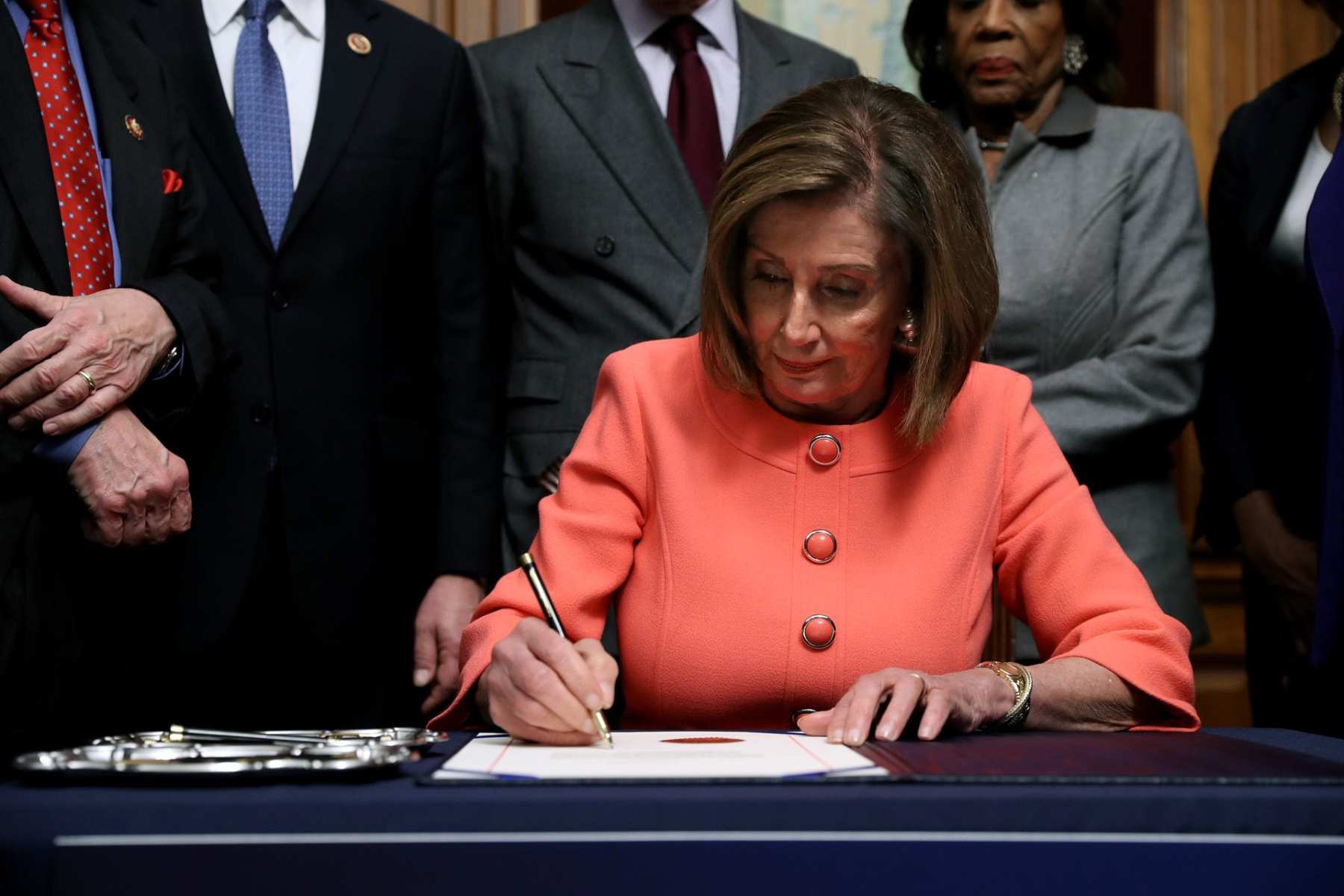We’re the only newsroom dedicated to writing about gender, politics and policy. Subscribe to our newsletter today.
U.S. House of Representatives Speaker Nancy Pelosi on Tuesday held the first vote aimed at removing Donald Trump from the Oval Office, as a growing number of Republicans indicated they may be willing to impeach the president over his encouragement of the mob that attacked the Capitol building.
By a 223-to-205 vote, the Democratic-led House approved a measure that calls on Vice President Mike Pence to invoke the 25th Amendment to the U.S. Constitution, which allows for a president’s removal if they are “unable to discharge the powers and duties of his office.” If Pence does not act — and he has said he will not — Pelosi has said she will move to a Wednesday vote on an article of impeachment that charges Trump with “incitement of violence.”
One Republican, Rep. Adam Kinzinger from Illinois, joined with Democrats to back the measure.
But in the upcoming impeachment vote, other Republicans are already weighing in. Rep. Liz Cheney of Wyoming, the highest-ranking Republican woman in the House, was one of several who said Tuesday that they would be voting to impeach Trump, as did Rep. Jaime Herrera Beutler of Washington.
Anti-Trump Republicans, some of whom worked tirelessly ahead of the election to secure his defeat, are already shoring up support for Republicans who decide to join Democrats in impeaching the president. The newly formed Republican Accountability Project will spend $50 million on the effort over the next two to three years.
Democrats hold the House by a 222-211 majority, so if they proceed to a vote, Trump is expected to be impeached irrespective of Republican support, which would make him the first president in U.S. history to be impeached twice.
In December 2019, Trump was impeached by the House over allegations that he asked for foreign help in winning the 2020 election and obstructed an investigation into the matter. Impeachment does not equal conviction and removal, however, and a February 5, 2020, vote in the Senate failed, allowing him to remain in office.
Earlier Tuesday, in a move that could bolster Democratic removal efforts, a group of anti-Trump Republicans and former members of the president’s administration formed the Republican Accountability Project. They will defend Republicans who cross party lines to support the president’s impeachment “because they get threatened with primary challenges every time they step out of line,” said Sarah Longwell, a Republican strategist involved in several anti-Trump efforts.
“It became urgent to announce it today to ensure that Republicans who might be influenced by threats from the president that they’re going to be primaried over this, that there would be somebody there to have their back,” Longwell said.
The Republican Accountability Project will operate within Defending Democracy Together, a political advocacy group that supports “democratic norms” and policies such as free trade and expanding legal immigration. The co-directors of the project will be Olivia Troye, a former aide to Vice President Mike Pence who resigned and Elizabeth Neumann, who resigned last year from the Department of Homeland Security, where she was a deputy chief of staff. They both supported Democrat Joe Biden in the 2020 election.
To remove Trump from office, the impeachment effort would need to pick up steam among Republicans in the Senate, where a conviction would require support from two-thirds of its 100 members. So far, only a handful of Republicans have expressed an openness to impeaching Trump and none have specifically committed to it.
Republican Sen. Lisa Murkowski of Alaska said last week, for example, that Trump has “caused enough damage” and urged him to resign.
Republicans held a majority in the last Senate, which they will lose with the upcoming swearings-in of Biden and Kamala Harris as president and vice president, and of Georgia Democrats Raphael Warnock and Jon Ossoff, who won runoff elections last week.
In addition, the Senate is in recess until January 19, and Republican Majority Leader Mitch McConnell has said that, under the terms of a bipartisan agreement reached earlier this month, senators cannot be called back into session unless the chamber unanimously agrees to do so.
Incoming Democratic Senate Majority Leader Chuck Schumer on Tuesday disagreed, saying that there was 2004 legislation that allows the Senate majority and minority leaders to jointly reconvene the chamber in “times of emergency.”
The New York Times reported Tuesday that McConnell has become less resistant to the impeachment effort, believing it could allow his members to distance themselves from the president and his actions. McConnell’s office did not respond to a query asking whether this would affect when the senators would return.
If the Senate was not in session to act, Pelosi could wait until after the January 20 inauguration to send the article of impeachment to the chamber. The move would delay what could be a consuming impeachment trial and allow the Senate to first focus on the confirmation of Biden’s cabinet and other pressing matters such as additional coronavirus relief.
While a post-inauguration Senate conviction would no longer remove Trump from office, it would deny him his lifetime pension. The Senate could also vote to bar him from running for the White House in 2024.
Correction: An earlier version of this story misstated the year of the alleged election interference related to Trump’s first impeachment.





